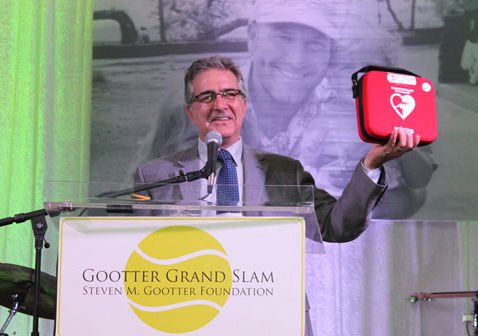Steven M. Gootter was all heart, and the foundation formed in his honor bears testament to that.
“I only met Steve half-a-dozen times, but he was a really bright, hysterically funny, generous, unpretentious, charismatic guy ... and a terrific husband and father. When he passed away tragically and unexpectedly, his family was overwhelmed with grief,” said Elliot Glicksman, who will act as master of ceremonies and auctioneer at the 12th Annual Gootter Foundation Gala on March 3.
“They took that grief and tried to turn it into a positive ... by making a concerted effort to put an end to sudden cardiac death.”
Established in 2005, the foundation was among the first nonprofits in the nation dedicated to eradicating sudden cardiac death. Since its inception, it has raised more than $4 million to provide education, research and prevention for sudden cardiac death, which kills more than 930 people each day nationwide and ranks as the No. 1 cause of natural death in the United States, according to the American Heart Association.
Unlike a heart attack, which results when a blockage interrupts blood flow to the heart and damages the heart muscle, sudden cardiac death is most commonly the result of an irregular heart beat (arrhythmia) triggered by an electrical malfunction in the heart. Abruptly and without warning, arrhythmia can cause the heart to stop pumping blood; death can occur within 10 minutes unless CPR is administered and an automated external defibrillator is used to restore normal heart rhythm.
The foundation’s education efforts center around promotion of awareness about intervention with chest-compression-only CPR and a defibrillator in the event of a cardiac incident. Hence, the foundation has also implemented a defibrillator-donation program through which it has distributed more than 200 devices to local nonprofits, recreation centers, schools, churches and police agencies.
“Our feeling is that AEDs (automatic external defibrillators) should be like fire extinguishers. They should be everywhere, since it is proven that they save lives,” said Andrew Messing, Gootter’s brother-in-law and president of foundation. “Some people are afraid because they say they don’t know how to use them, but the devices have a computer-activated voice that walks you through it so you can’t shock someone if it is not necessary. Until they find a cure for SCD, these devices are critical and we will continue to work on getting more out in the community.”
Last year, the foundation sponsored greater Tucson in becoming a PulsePoint-connected community in partnership with local fire districts. PulsePoint is a free mobile phone application that alerts users about emergency dispatches in their vicinity to increase the possibility that victims in cardiac arrest will receive assistance from someone trained in CPR and the use of defibrillators. The app also notifies users about the location of the nearest defibrillator during an emergency.
Messing said the app is critical, since every minute counts for victims experiencing sudden cardiac arrest.
“Each minute during minutes one through 10, the chance of survival decreases substantially. If there is someone in the building or down the street who is qualified in CPR that can reach the victim before the first responders, we want them to get there. We are excited to be one of the first cities in the country to offer this, and the key is to get the word out so that people are aware and download the app,” said Messing.
Progress continues on the research front as well. The foundation reached its initial goal in 2012 of establishing the Steven M. Gootter Endowed Chair for the Prevention and Treatment of Sudden Cardiac Death at the University of Arizona Sarver Heart Center.
Additionally, the foundation now supports Sarver Grand Rounds and will sponsor five speakers with international reputations this year through the Steven M. Gootter Foundation Visiting Professorships.
Finally, for the fourth consecutive year, the foundation has funded the Sarver Heart Center Resuscitation Laboratory. Messing said that under Dr. Karl Kern, the lab is performing ground-breaking clinical research designed to improve survival and neurological function outcomes after cardiac events.
Messing credits many Tucsonans — including Glicksman, who will receive the 2017 Philanthropy Award at the upcoming gala for years of service to the foundation and other nonprofits — with contributing time, talent and money to the foundation’s success.
Glicksman, a local attorney and comedian, said he is gratified to offer his support.
“There are lots of things I can’t do, but if I can tell some jokes at an event and help raise money at an auction, or draw one or two more folks into a crowd by speaking at an event, I am happy to do it,” Glicksman said.
Glicksman appreciates the perspective the Gootter family brings with its work in Steve’s name.
“Steve is loved, he is remembered and he is making a difference in people’s lives. Aren’t those the only three things that you can hope for when you go?” he said.





